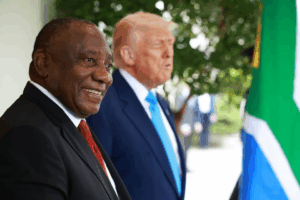By Imraan Buccus
The report on the winter riots by the presidential panel of experts confirms the explanation of the events given by grassroots activists as the riots and acts of organised sabotage were unfolding. That explanation is that law and order broke down when the police stood down as very small groups of Zuma supporters in the ANC began to act with brazen unlawfulness.
This created the opportunity for the poor, who were suffering endemic hunger
and angered by the withdrawal of the Covid grant, to take the opportunity to
seize food from shops. One of the biggest bread riots in recent global history
then unfolded. After a few days of rioting the organised Zuma supporters in the
ANC, as well as criminal networks, used the cover of the general chaos to push
their own agenda, and push it hard. This includes systematic attacks on
infrastructure.
The report is also good at keeping in mind the massive unemployment crisis that
led to the break down in law and order. However, it is not always consistent in
bringing in a social analysis and it oscillates between an empirically grounded
analysis of events and the conspiratorial explanation that sees them in terms
of hidden ‘masterminds’ secretly directing things – including the hundreds of
thousands of people who seized food in the early days of the riots.
The media routinely collapses into the conspiratorial explanation of the riots.
This is extremely unfortunate as it completely denies the agency of the
hundreds of thousands of rioters, and wildly exaggerates the levels of support
for Zuma and the RET faction inside the ANC. It also masks the extent to which
catastrophic levels of unemployment – which result in widespread hunger – generated
massive social instability.
The report is very strong on the complete failure of the state during the crisis. It pulls no punches and what emerges is a case of complete state failure. By the time that the riots hit the ANC had already destroyed SAA, the rail system and many other important organisations and institutions. The riots showed that the police have also been destroyed by the ANC.
The reports’ primary focus for a way forward is on policing. However, the
abject failure of Ramaphosa’s ‘new dawn’, including the failure to act against
the criminals and authoritarians in the ANC, and the ANC’s complicity with the
EFF’s virulent attacks on democratic norms and institutions, means that there
will be no quick resolution of the collapse in policing.
Moreover, there are also slim prospects of some sort of social compact that could ease the tremendous pressure on individuals and families impacted by the unemployment crisis.
Every state needs to retain a monopoly on violence, and to be able to deal with treason decisively. There is no doubt that the pro Zuma forces who launched an attack on infrastructure during the wider bread riots, and later the generalised looting, were engaged in treason. The report is right to insist that the state must have the will and the capacity to act against further attempts at treason by RET forces.
However, a very strong social response to the riots is just as important. After all, if there had been no tinder on which the RET forces could throw a spark by showing that law and order had broken down the riots would not have happened, or at least not in that moment.
Poling must be fixed, and an end must be put to the impunity of the RET force and the EFF for criminal and anti-democratic actions. But the most important way to secure our future is to build a more inclusive and just society. The report could and should have said much more on this.
Dr Buccus is Al Qalam editor.


